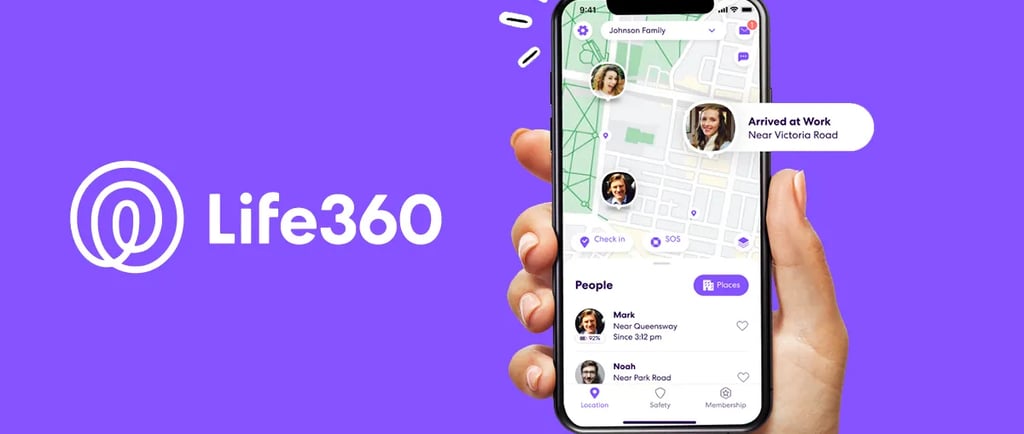"I Survived. I Lived. Then I Woke Up."
Life360 for Senior Safety: Peace of Mind Without Hovering
Life360 turns phones and Tile trackers into a simple safety net for older adults—blending respectful independence with practical tools like location sharing, SOS alerts with 24/7 dispatch, and gentle “No Show” reminders. Here’s how to set it up smartly (and where fall detection really comes from).
PRODUCT REVIEWS
Christopher J
9/30/20254 min read


If your goal is “keep Mom independent, keep my heart rate down,” Life360 is a practical middle path. It’s a family safety app that trades helicoptering for helpful guardrails. Think of it as a quiet chaperone for the moments that matter: getting home, taking a walk, or making it to a weekly class.
What Life360 actually does for seniors
• Real-time location sharing and Place Alerts. Caregivers can see a loved one’s live location and get notified when they arrive or leave specific places (home, the senior center, the park). It’s built to reduce check-in texting while keeping a safety net in place. Life360
• “No Show Alerts.” A newer free feature that pings you only if someone doesn’t arrive by a set time. It lowers mental load because you don’t watch the dot all day—you only hear something if plans go off-script. Great for routines like day programs or church. Parents
• SOS alerts (with optional 24/7 Emergency Dispatch). A long-press in the app—or a triple-tap on compatible 2024 Tile trackers—sends a silent alert with location to chosen contacts, and, on paid plans, triggers Life360’s dispatchers to call, assess, and contact local responders if needed. For seniors who dislike “I need help” calls, this discreet signal is powerful. Life360+2Life360+2
• Crash Detection. If a senior still drives, Life360 can detect serious collisions using phone sensors, then notify contacts and, on eligible plans/regions, coordinate emergency services. It’s not magic—just smart use of motion data—but it has helped in real-world incidents. Life360+2Life360+2
• Tile integration for “people and things” in one map. Keys and wallets wander too. Life360 now fully manages Tile trackers, adds left-behind alerts, and lets a Tile double as a tiny SOS remote. This is especially useful for dementia-related wandering where a phone might be left behind but keys come along. The Verge+1
A quick word on fall detection (so we don’t pretend)
Life360 does not natively do automatic fall detection on phones or watches. If that’s a must-have, pair Life360 with devices that do—e.g., Apple Watch fall detection or a dedicated fall-detection app/device. Several senior-care roundups recommend using Life360 for location/alerts plus a separate fall solution such as FallSafety. That combo covers both “Where are they?” and “Did they fall?” without adding complicated hardware. Reddit+1
Privacy and dignity: controls that matter
Independence is not surveillance. Within Life360, seniors can pause sharing, limit it by Circle (e.g., share with daughter, not bowling group), or use “Bubbles” to blur precise location temporarily. That matters psychologically—it preserves autonomy while still providing a general safety halo. Also note: precise location can be toggled at the OS level, and you can choose who sees what, when. Life360+2life360-legal.zendesk.com+2
On data and insurers: clarity time
Life360 partners with Arity (an Allstate company) for driving analytics and optional, opt-in programs. Headlines around insurer data are noisy; the important bit is consent. If you’re setting up Life360 for a senior, stick to safety features and keep any “personalized insurance quotes” prompts off. Read the consent screens; you can use Life360 without opting into data-sharing programs. New York Post+2Reuters+2
For dementia-related wandering
Life360’s core value here is gentle predictability: check the map quickly, use Place Alerts around home and favorite routes, and keep a Tile on keys or a walker for backup. Life360’s own guidance for caregivers acknowledges how dangerous wandering can be and offers practical setup tips—useful when routines change. Life360+1
Plans and pricing snapshot
Life360 offers free and paid tiers. Free covers core location sharing and Crash Detection notifications; paid plans add Emergency Dispatch, longer location history, and more. Recent updates: SOS Alerts are included at the Silver level (reported at $7.99/month), while Gold retains 30 days of history (reported at $14.99/month). Always check current pricing in-app before you commit. The Verge+1
Set-it-right setup (five-minute checklist)
Keep it voluntary. Explain what’s shared and when. Let the senior try the “Share My Location” toggle and Bubble feature, so it feels like a tool they control—not something done to them. Life360+1
Add Places that match routines: home, pharmacy, day center, friend’s house. Start with two or three; don’t overdo alerts on day one. Life360
Enable SOS and teach the long-press. If you use Tile, pair a 2024 model and practice the triple-tap countdown. Life360+1
For drivers, confirm Crash Detection permissions (motion, precise location “Always”). Place the phone in a stable spot in the car. Life360+1
Add fall detection via Apple Watch or a dedicated app/device; keep Life360 for location and SOS. Reddit+1
A human note
Our team’s recovery story taught us that independence is precious—and fragile. Tools like Life360 aren’t about control; they’re about lowering the background anxiety so families can focus on real connection and healthy routines. Use tech to reduce the brain fog of worry, then spend that freed-up energy on a walk, a stretch session, or calling a friend who needs to hear your voice.
Suggested sources to verify and explore
Life360 SOS and Emergency Dispatch overview; Life360 help center articles on SOS and Crash Detection; Parents.com on “No Show Alerts”; The Verge on Tile integration and SOS via Tile; Life360 blog and guides on seniors and wandering; Crash Detection support and troubleshooting; independent senior-tech roundups comparing fall-detection options. Assisting Hands Home Care Fremont+9Life360+9Life360+9
Call to action
If you’re supporting an older adult, set up Life360 this week with two Places and an SOS plan, then add fall detection via watch or pendant. Use the calm it creates to build a daily micro-habit—10 minutes of stretching, a brisk block-long walk, or a gratitude note. Tech can’t replace care, but it can give you back the bandwidth to offer it. Stay curious and keep an eye on updates—features like “No Show Alerts” prove the best safety tech is getting quieter and kinder.

Do you have a life changing story and want to help others with your experience and inspiration. Please DM me or Send me an email at the links below
Contact Me
© 2025. All rights reserved.
Privacy Policy
